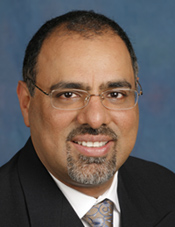 By Raja Rajamannar, SVP and Chief Innovation and Marketing Officer at Humana
By Raja Rajamannar, SVP and Chief Innovation and Marketing Officer at Humana
Mobile devices – from cell phones to iPads, eReaders to Nintendo DS – are becoming essential tools for monitoring our health and wellbeing, thanks to their ability to access and share information anywhere. Many of today’s five billion cell phone users, for instance, can use global-positioning satellite, or GPS, to locate health clinics, download medical information and even find healthy restaurant options in their area. Mobile applications also can monitor health progress, helping to shift consumer behaviors toward managing wellness and away from treating sickness.
Nearly 70 percent of consumers say they’re interested in home or remote monitoring devices that enable self-monitoring of their condition and electronic reporting of results to their physicians, according to a recent survey by Deloitte Center for Health Solutions. Seniors and consumers with chronic conditions expressed the highest level of interest, at 78 and 75 percent, respectively.
As a result, researchers and developers from corporations to academia are introducing innovative, health-related mobile devices and systems. For instance, researchers at the University of Washington in Seattle and Intel have developed two promising mobile systems, dubbed Houston and UbiFit. These encourage users to increase daily step counts and to vary physical activity. Data show these systems substantially influence how a user engages in healthy behaviors.
Still, achieving wellness, or wellbeing, is difficult. It often requires discipline and major behavioral changes before results emerge. As the prevalence and costs of chronic diseases rise, lifestyle changes are an essential means of prevention and wellbeing. While difficult for some, health-centric changes may prove easy for others. Consider lazy hobbyists, such as video “gamers.” Some video game manufacturers, such as Nintendo, are developing new platforms, like Nintendo DS, for on-the-go lifestyles.
At Humana we are exploring how video games can help spur healthy habits through our Innovation Center. DIDGET, an FDA-approved blood-glucose monitoring system for Humana pediatric patients, is being rolled out with Bayer Healthcare. It plugs into Nintendo DS or Nintendo DS Lite systems and awards points to users for testing their glucose levels. Points are used to unlock new game levels and buy items inside the game.
We are testing how these mobile applications successfully influence behaviors – even lifestyle changes. To date, DIDGET users have improved their self care and reduced diabetes-related urgent and emergency-care visits by 77 percent.
Mobile and in-home tech developments will serve as health assistants long into the future – and not just to consumers. Eighty-one percent of physicians are expected to own smartphones by 2012, up from 64 percent in 2009, predicts Manhattan Research. Of those who do, 94 percent use them to communicate, manage personal and business workflows, and access medical information, found a recent study by the Spyglass Consulting Group.
Reflecting the growing use of mobile technology by physicians, at Humana we are developing a specialized in-home scale for chronic heart patients to connect with physicians in real-time. Patients can step on the scale at home and deliver live data, such as weight, blood pressure and blood-glucose levels, directly to their primary care physician. This technology will enable physicians to spot trends in patients’ conditions and, potentially, treat at-risk situations before they become emergencies.
These possibilities for improving health are emerging because mobile technology, via always-connected networks, allows consumers to take control of healthy behaviors to benefit their wellbeing. Health information, tools and alerts are accessible in the palm of our hand, making our on-the-go society more aware and capable of changing health behaviors than ever before.
Raja Rajamannar is senior vice president and chief innovation and marketing officer at Humana Inc., a major health benefits company.

















